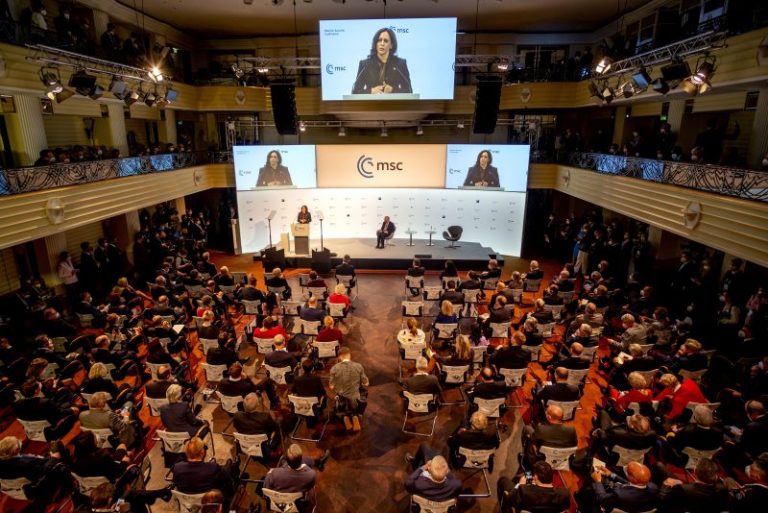MUNICH — Vice President Harris touched down here Thursday in preparation for a speech to world leaders that will express enduring solidarity with Ukraine in its conflict with Russia, even as the White House has warned Kyiv it could soon see limits in support from the United States and other countries.
Harris is scheduled to speak at the Munich Security Conference on Saturday, the second straight year she has led the U.S. delegation to the international gathering of political, intelligence and defense leaders. This time, the vice president is addressing the global summit just days before the first anniversary of the Russian invasion of Ukraine, as the world braces for what could be a decisive spring fighting season.
A year ago, Harris addressed the conference with the continent on the brink of war; 150,000 Russian troops were massed at the Ukrainian border and efforts to reach a diplomatic solution had been nearly exhausted. She also held meetings with European leaders, including Ukrainian President Volodymyr Zelensky, pledging America’s support in the face of Russian aggression. Russian troops invaded Ukraine five days later.
In the year since, the Western coalition has largely held firm, imposing sanctions on Moscow and sending substantial weaponry to Ukraine. But Republicans retook the House in November, and many conservatives have vowed to pull back their support to Ukraine, while Europe’s long-term appetite for funding the war effort remains unclear, especially as leaders agonize over the conflict’s effect on the global economy.
On Saturday, Harris will convey the continuing U.S. commitment to Ukraine, aides say, emphasizing that the Biden administration is determined to maintain support for Zelensky’s efforts to defend his country. Privately, White House officials have told leaders in Ukraine that its most recent aid packages represent Kyiv’s best chance to decisively change the course of the war.
Biden will travel to Europe on Monday to commemorate the first anniversary of the conflict, giving a speech in Poland and meeting with foreign leaders.
Biden has promised to back Ukraine for “as long as it takes,” but previous packages approved by Congress, including a surge in weapons and aid, were delivered under a Democratic-controlled House and Senate. “There is an enduring commitment on behalf of the alliance, but it’s not without sacrifice that each country is doing that,” Harris told Politico ahead of her trip. “And that’s to be applauded. … A nation standing in defense of certain foundational principles when the going gets tough.”
In addition to Saturday’s speech, Harris will meet with British Prime Minister Rishi Sunak, Finnish Prime Minister Sanna Marin, Swedish Prime Minister Ulf Kristersson and German Chancellor Olaf Scholz, according to senior administration officials.
Harris’s second trip to Munich marks the continued evolution of a vice president who came into office with relatively little foreign policy experience. Her advisers viewed last year’s speech as an effective effort to communicate America’s stance on the pending war, one that boosted Harris’s standing on the international stage. Harris also held bilateral and multilateral talks with a number of key European leaders.
“Even in the most difficult times for our transatlantic community and even when our system has been tried and tested, we, the United States and Europe, have come together and demonstrated our strength and our unity, just as we do today — as we stand in this decisive moment, with all eyes on Ukraine,” she told the audience last year.
This year’s speech by Harris also promises to be a key part of the conference, in addition to serving as a prelude of sorts to Biden’s trip to Europe.
Biden will “reaffirm the United States’ unwavering support for the security of the alliance,” White House press secretary Karine Jean-Pierre told reporters this week. He will meet with leaders of the Bucharest Nine, a group of nations on NATO’s eastern flank including the Czech Republic, Bulgaria and Estonia that was created after the Russian annexation of Crimea in 2014.
The White House said Biden may hold additional meetings in Poland, but has not said whether he would meet with Zelensky, who visited Washington in December, on his first trip to a foreign country since the Russian invasion.

